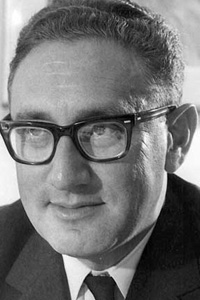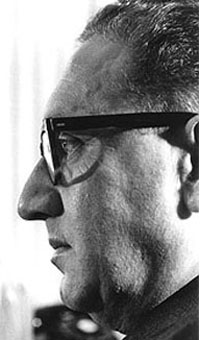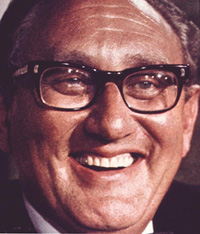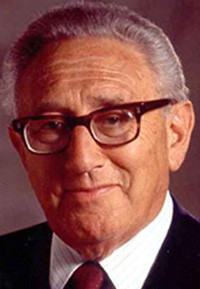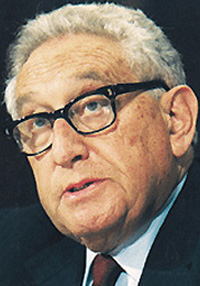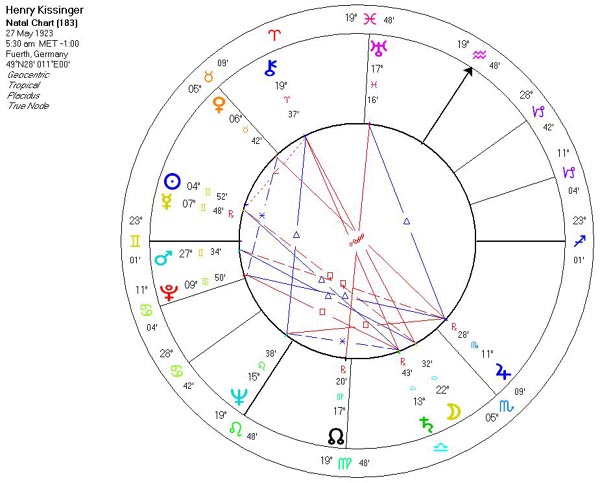Copyright Michael D. Robbins 2005
Astro-Rayological
Interpretation & Charts
Quotes
Biography
Images and Physiognomic Interpretation
Even a paranoid has some real enemies.
The illegal we do immediately. The unconstitutional takes a little longer.
(Saturn in Libra.)People are generally amazed that I would take an interest in any form that would require me to stop talking for three hours.
(Sun & Mercury in Gemini. Venus in Taurus.)High office teaches decision making, not substance. [It] consumes intellectual capital; it does not create it. Most high officials leave office with the perceptions and insights with which they entered; they learn how to make decisions but not what decisions to make.
(Saturn & Moon in Libra opposition Chiron in 11th house.)he statesman's duty is to bridge the gap between his nation’s experience and his vision.
(Uranus in Pisces conjunct MC.)In crises the most daring course is often safest.
Some of the critics viewed Vietnam as a morality play in which the wicked must be punished before the final curtain and where any attempt to salvage self-respect from the outcome compounded the wrong. I viewed it as a genuine tragedy. No one had a monopoly on anguish.(Pluto in Cancer?)
(Mars conjunct Ascendant.) Power is the great aphrodisiac.
(Pluto trine Jupiter in Scorpio?)I don't read books, I write them.
(Sun & Mercury in Gemini.)If we do what is necessary; all the odds are in our favor.
A little uncertainty is good for everything.
(Uranus on MC.)
The absence of alteratives clears the mind marvelously.
No one will ever win the battle of the sexes; there's too much fraternizing with the enemy. A leader does not deserve the name unless he is willing occasionally to stand alone.
(Sun in 12th house.)A leader who confines his role to his people's experience dooms himself to stagnation; a leader who outstrips his people's experience runs the risk of not being understood.
(Chiron in 11th house in Aries.)Accept everything about yourself - I mean everything, You are you and that is the beginning and the end - no apologies, no regrets.
Art is man's expression of his joy in labor.(Venus in Taurus opposition Jupiter in 6th house.)
Diplomacy: the art of restraining power. For other nations, utopia is a blessed past never to be recovered; for Americans it is just beyond the horizon. If you don't know where you are going, every road will get you nowhere. Leaders must invoke an alchemy of great vision.(Neptune in Leo.)
The longer I am out of office, the more infallible I appear to myself.
If peace is equated simply with the absence of war, it can become abject pacifism that turns the world over to the most ruthless.(Pluto & Mars in 1st house.)
The great tragedies of history occur not when right confronts wrong but when two rights confront each other.
Henry Alfred Kissinger (born May 27, 1923 as Heinz Alfred Kissinger) is a German-born American politician. He is former National Security Advisor in the Nixon Administration, Secretary of State in the Ford Administration, and winner of the 1973 Nobel Peace Prize. Kissinger played a dominant role in American foreign affairs between 1969 and 1977.
An admirer of Realpolitik, Kissinger pioneered the policy of détente, began strategic arms reduction talks, "opened" China, ended the protracted Vietnam War, maintained friendly diplomatic relationships with anti-Communist military governments in the Southern Cone, approved of covert CIA intervention in Chilean politics, and ended the U.S. doctrine of undifferentiated containment of the Soviet Union through direct military intervention. Kissinger's foreign policy record has made him a controversial figure amongst anti-war liberals and conservative anti-Communist hawks alike.
Some of Kissinger's critics accuse him of having committed war crimes while in government, the most prominent of which Christopher Hitchens. Although these allegations have not yet been proven in a court of law, it is considered legally dangerous for Kissinger to enter many countries in Europe and South America.
Personal background
Kissinger was born in Fürth in Franconia (Bavaria) as Heinz Alfred Kissinger into a Jewish family. In 1938, fleeing Adolf Hitler's persecution, his family moved to New York, New York. Kissinger was naturalized a U.S. citizen on June 19, 1943.He spent his high school years in the Washington Heights section of upper Manhattan but never lost his pronounced German accent. Kissinger attended George Washington High School at night and worked in a shaving-brush factory during the day. While attending City College of New York, in 1943, he was drafted into the army, trained at Clemson College in South Carolina, and became a German interpreter for the 970th Counter Intelligence Corps.
Henry Kissinger received his BA degree summa cum laude at Harvard College in 1950. Kissinger is rumored to be the only person to receive a perfect grade point average from Harvard, but in fact he received one B in his senior year. He received his MA and Ph.D. degrees at Harvard University in 1952 and 1954, respectively. His doctoral dissertation was titled A World Restored: Metternich, Castlereagh and the Problems of Peace 1812–22. Kissinger's doctoral dissertation was a continuation of his undergraduate thesis of mere 383 pages consequently prompting the "Kissinger rule" or one-third that length.
A liberal Republican and keen to have a greater influence on American foreign policy, Kissinger became a supporter of and advisor to New York Governor Nelson Rockefeller, who sought the Republican nomination for President in 1960, 1964 and 1968. After Richard Nixon won the presidency in 1968, he offered Kissinger the job of national security adviser.
With his first wife, Ann Fleischer, he had two children, Elizabeth and David. He currently lives with his second wife, Nancy Maginnes Kissinger, in Kent, Connecticut. He is the head of Kissinger and Associates, a consulting firm.
Kissinger is well known as being a New York Yankees fan. He is also a great fan of the German soccer club Greuther Fürth from his home town.
Political History
On October 31, 1973, Egyptian Foreign Minister Ismail Fahmi meets with Richard Nixon and Henry Kissinger about a week after fighting ends in the Yom Kippur WarKissinger was Nixon's national security advisor (1969-73) and later his secretary of state (1973-74). He also stayed on as President Gerald Ford's Secretary of State from 1974-77.While working for Nixon, Kissinger established the policy of détente with the Soviet Union. He also negotiated the Strategic Arms Limitation Talks (culminating in the SALT I treaty) and the Anti-Ballistic Missile Treaty. In July and October 1971, Kissinger made two secret trips to the People's Republic of China to confer with Premier Zhou Enlai and to set the stage for the groundbreaking 1972 summit between the PRC and the US as well as the normalization of relations between the two countries. Today, Kissinger is often called by Chinese leaders "the old friend of the Chinese people." His talk with Zhou Enlai was highly secretive. Recently declassified documents show that the talk highly focused on the Taiwan issue.
Kissinger, shown here with Zhou Enlai and Mao Zedong, negotiated the normalization of relations with the People's Republic of China.Kissinger was awarded the 1973 Nobel Peace Prize along with Le Duc Tho of Vietnam for their work on the Vietnam peace accords. Kissinger and Nixon had come to office in 1968 on a promise of a quick end to the Vietnam War, but the intervening years saw an escalation in conflict as well as the extension of the US bombing campaign (overseen by Kissinger) in Laos and Cambodia. Le Duc Tho refused the prize on the grounds that there was as yet no peace.In 1973, Kissinger negotiated the end of the Yom Kippur War, which began with Egypt's invasion of the Sinai and Syria's invasion of the Golan Heights.
Kissinger may have played a role in the September 11, 1973, coup by Augusto Pinochet against the government of Chilean President Salvador Allende. Documentary evidence shows CIA interest in promoting a coup, but Kissinger says he reversed his initial position supporting a coup well before it happened.
Despite occasional allegations of underhanded dealings in foreign countries, Kissinger was largely popular with the public and became one of the better-liked members of the increasingly unpopular Nixon administration. Kissinger had little involvement with the Watergate scandal that would eventually ruin Nixon and many of his closest aides – a fact which greatly increased Kissinger's reputation as the "clean man" of the bunch. At the height of his popularity he was even regarded as something of a sex symbol and was seen dating starlets such as Jill St. John, Shirley MacLaine, and Candice Bergen.
In December 1975, Kissinger and Ford met with President Suharto of Indonesia; on that occasion they gave their approval for his invasion of East Timor, which led to the death of 200,000 Timorese. Until the release of documents confirming his foreknowledge of the invasion, Kissinger claimed that he was unaware of Suharto's intentions when he left Jakarta. Kissinger still maintains that the nature and influence of his "approval" of the invasion are presented radically out of context. He argues that the invasion was already a foregone conclusion planned well in advance, and was not simply something that he convinced Suharto to do on the spot. However, Kissinger's apparent strong dislike of discussing the issue remains a source of controversy (see below).
Kissinger is updated on the latest situation in South Vietnam on April 29, 1975, one day before its government falls.Kissinger left office when former Georgia governor Jimmy Carter defeated Ford at the 1976 elections. He played a relatively minor role in the Reagan (1981-89) and first Bush (1989-93) administrations, mainly because the neo-conservative groups which dominated the Republican Party by 1981 considered Kissinger's detente policy to have been a form of appeasement of the Soviet Union. He continued to participate in policy groups such as the Trilateral Commission and to do political consulting, speaking, and writing.
In 2002, President George W. Bush appointed Kissinger to chair a committee to investigate the events of the September 11 attacks. His appointment led to widespread criticism, generally taken from the position that Kissinger has never been supportive of the public's right to know, but also because some vocal groups have alleged that some of his actions undertaken in the Nixon and Ford administrations were war crimes (see "Accusations Against Henry Kissinger," below).
In response, Congressional Democrats insisted that Kissinger file financial disclosures to reveal any conflicts of interest. Both Bush and Kissinger claimed that Kissinger did not need to file such forms, since he would not be receiving a salary. When Congressional Democrats insisted, however, Kissinger resigned from the commission. On December 13, 2002, he stepped down as chairman, citing conflict of interest with his clients.
In 2005, Kissinger offered a public apology for using foul, offensive and uncivilized language in 1971 to describe Indira Gandhi, then Prime Minister of India, and Indians in general. The transcripts showed that he was eager to ignore the crisis in East Pakistan and backed President Nixon's support for an oppressive dictatorship in Pakistan.
Legal problems
In the first years of the new millennium, Kissinger became dogged by legal problems stemming from actions he took while in government. These ranged from requests from judges simply wishing to question him about atrocities which occurred while he was in office to suits charging him with complicity in human rights violations. There are now many countries in Europe and South America to where Kissinger avoids travel due to vulnerability to legal action. He is known to take legal advice before traveling anywhere.On 31 May 2001, French Judge Roger Le Loire had a summons served on Kissinger at the Ritz Hotel in Paris, where Kissinger was staying. The judge wanted Kissinger to answer questions about the death of French citizens under the Pinochet regime and about his knowledge of Operation Condor. Rather than appear before the magistrate the next day, Kissinger fled Paris that same evening and directed all inquiries to the US State Department. [1] [2]
In July 2001, the highest court of Chile granted investigating judge Juan Guzman the right to question Kissinger about the 1973 killing of the American journalist Charles Horman, whose execution by forces loyal to General Augusto Pinochet was dramatized in the 1982 Costa-Gavras film, Missing. The judge’s questions were relayed to Kissinger via diplomatic routes but went unanswered. Representative Cynthia McKinney later wrote to Secretary of State Colin Powell, asking for help in persuading Kissinger to take the stand. The Chilean courts later announced that if they continued to meet with no response to their requests for co-operation, they would seek Kissinger's extradition. Sergio Corvalan, a lawyer involved in the case, said: "Kissinger has never answered to justice and he had an important role in the coup in Chile and an influence in the Chilean military government." [3]
In August 2001, Argentine Judge Rodolfo Canicoba sent a letter rogatory to the US State Department, in accordance with the Mutual Legal Assistance Treaty (MLAT), requesting a deposition by Kissinger to aid the judge's investigation of Operation Condor. [4]
On 10 September 2001, a civil suit was filed in a Washington, D.C., federal court by the family of Gen. René Schneider, former Commander-in-Chief of the Chilean Army, accusing Kissinger of arranging his 1970 murder for opposing a military coup. The suit asserts that Kissinger gave the order for the elimination Schneider because he refused to endorse plans for a military coup. The prosecution case is based solely on U.S. government declassified documents. Schneider’s two sons are suing Kissinger and CIA director Richard Helms for $3 million. [5] [6] [7]
On 11 September 2001, the 28th anniversary of the Pinochet coup, Chilean human rights lawyers filed a criminal case against Kissinger along with Augusto Pinochet, former Bolivian dictator Hugo Banzer, former Argentine dictator Jorge Rafael Videla, former Paraguayan dictator Alfredo Stroessner, and several other US, Chilean, and Argentine officials for their role in Operation Condor. The case was brought on behalf of some fifteen victims of Operation Condor, ten of whom were Chilean. Several international organizations also joined the suit as plaintiffs, including the US National Lawyer’s Guild, the American Association of Jurists, and the Guatemalan Rigoberta Menchu Foundation. Kissinger and the others were charged with being intellectual or material authors or accomplices to crimes against humanity, war crimes, violations of international treaties, conspiracy to commit murder, kidnapping, and torture.
In late 2001, the Brazilian government canceled an invitation for Kissinger to speak in São Paulo because it could no longer guarantee his immunity from judicial action.
In 2002, during a brief visit of his to the UK, a petition for Kissinger's arrest was filed in the High Court in London, citing the destruction of civilian populations and the environment in Indochina during the years 1969 to 1975. According to media reports, the High Court ruled in such a manner as to leave room for a further application. At the same time, supported by judges in France, the Spanish judge Baltasar Garzón, who engaged in a failed attempt to get Pinochet extradited from the United Kingdom for questioning, also requested Interpol to detain Kissinger for questioning during his visit. British authorities refused his request.
Activists from the East Timor Action Network (ETAN) have repeatedly sought to question Kissinger during his book tours, accusing him of supporting Indonesia's 1975 bloody occupation of the former Portuguese colony East Timor. A subsequent human rights commission proposed that the UN itself set up a war crimes tribunal. ETAN as argued that the tribunal to extend back to the original invasion and could become a tool to find out what actually happened, and a mechanism for trying Kissinger. "I believe a criminal case can be made against him," says John Miller, a spokesman for the group. "One country invaded another. He aided and abetted genocide. He provided a political go-ahead and was instrumental in continuing the flow of U.S. weapons."
Observers note that in many cases, Kissinger is not being sought as a defendant; he is wanted first and foremost as a witness, but his refusal to cooperate, they claim, suggests he has something to hide. Kissinger's position is complicated by the fact that documents declassified by the State Department have contradicted his own statements. A declassified verbatim conversation between Kissinger and General Suharto on the day of the invasion of East Timor in 1975 reveals Kissinger giving approval to the proposed annexation, and also promising to keep a flow of weapons coming to Indonesia. Declassified records also indicate, for example, that Kissinger had urged the apartheid regime in South Africa to intervene in Angola before a single Cuban soldier had landed, which contradicts earlier statements by him. [8] [9]
Recently declassified documents obtained by the National Security Archive also show that Kissinger did not raise objections to the practices of the dictatorial Argentine military junta; the junta was exercising total authority over combatting active Marxist guerrilla groups such as the Montoneros and ERP. It is known to have "disappeared" approximately 10,000 to 30,000 Argentines, many believed to be nonviolent dissidents, and tortured thousands more at documented secret detention centers. However, the junta's restrictions on free speech were somewhat relaxed by new Chairman General Leopoldo Galtieri in 1981.
In a meeting, Secretary Kissinger told Argentine Foreign Minister Admiral César Augusto Guzzetti:
"Let me say, as a friend, that I have noticed that military governments are not always the most effective in dealing with these problems. ...So after a while, many people who don't understand the situation begin to oppose the military and the problem is compounded. The Chileans, for example, have not succeeded in getting across their initial problem and are increasingly isolated. You will have to make an international effort to have your problems understood. Otherwise, you, too, will come under increasing attack. If there are things that have to be done, you should do them quickly. But you must get back quickly to normal procedures."
He also assured Guzzetti that the U.S. would not cause the junta any "unnecessary difficulties" and urged them to complete their mission and get back to normal procedures before Congress reconvened and had a chance to consider sanctions.Criminal accusations of Christopher Hitchens
The February and March 2001 issues of Harper's Magazine featured a two-part series of articles by British journalist Christopher Hitchens in which he charged Kissinger with war crimes (the articles were later published as a book, The Trial of Henry Kissinger, ISBN 1859846319). Hitchens' charges were extensively reported on and sparked widespread discussion. In these pieces, Hitchens charged Kissinger with conspiracy to commit murder and war crimes. He argues that (1) on at least one occasion, Henry Kissinger conspired to commit murder, and (2) on numerous other occasions, Kissinger was the primary force behind certain acts that could quite plausibly be considered war crimes.Hitchens' primary charges against Kissinger include:
In illegal talks with representatives of the South Vietnamese government in 1968, Kissinger advised them to pull out of the Paris Peace Talks, as they would get a better deal under an incoming Nixon administration.
As United States National Security Advisor to President Nixon, he directed the first phase of the illegal and secret U.S. bombings in Cambodia (1969-1975), and is thus complicit in the resulting 200,000 casualties.
As Nixon's National Security Advisor, he gave support to General Roberto Viaux's 1970 coup plot in Chile to prevent incoming President Salvador Allende's inauguration. The coup failed with the botched kidnapping attempt on constitutionalist Chilean Army Commander-in-Chief General René Schneider, who ended up dead at the hands of the coup-plotters. Hitchens thus implicates Kissinger in Schneider's murder.As Nixon's National Security Advisor, he did not object to West Pakistan's genocide against Bengalis in East Pakistan (now Bangladesh) during the third Indo-Pakistani War because Pakistan was a Cold War ally.
As Nixon's secretary of state, he supported the Chilean military junta headed by General Augusto Pinochet following a 1973 coup, despite his involvement in human rights abuses directed towards suspected Marxists and political opponents.As Nixon's Secretary of State, he was complicit in the anti-Communist Greek military junta's backing of an attempted Greek Cypriot coup attempt in Cyprus in 1974. The failed plot provoked Turkey to occupy the northern 40% of the island, which it still controls to this day. It also led to the downfall of the Greek junta.
As Ford's Secretary of State, he supported continued U.S. arms sales to Indonesia while it was annexing East Timor in 1975, and is thus complicit in the Army's subsequent mass atrocities against the East Timorese.
Rebuttals to Hitchens' charges include:Kissinger maintains that the bombings of Cambodia were not illegal, since Cambodia itself had been unable to defend its neutrality. North Vietnamese Army and Viet Cong units were operating out of bases in the area, and ignoring them would have given them a free advantage in the ongoing conflict. Further, that to ignore them would make him complicit in all the U.S. and South Vietnamese deaths caused by NVA activity out of these countries.
Regarding the coup, Kissinger, as chair of the 40 Committee overseeing foreign operations, said to Nixon on October 15, "This looks hopeless. I turned it off. Nothing could be worse than an abortive coup." Viaux's failed coup took place a full week later without direct CIA support. The Church Committee (see: Senator Frank Church), normally highly critical of the Nixon administration's foreign policy, found that the weapons used by Viaux's subordinates "were, in all probability, not those supplied by the CIA to the conspirators." [10]
There was some evidence [11] that Kissinger bore direct responsibility in the U.S.'s failure to condemn Pakistani President Yahya Khan during the crisis as seen in the Oval House conversations. He also tried to involve China in the event of a war, to threaten India from involving itself in Pakistan's internal problems. The reason for the "tilt" was that Pakistan, a cold war ally maintained friendly relations with China with whom the US wished to move closer to. Kissinger himself clarified that such policies and statements were to be viewed from the Cold War era perspective.
There is no evidence that Kissinger supported the junta's moves in Cyprus. In his book Years of Renewal, Kissinger says of the elected President of Cyprus, "...Makarios, the proximate cause of most of Cyprus's tensions, was also the best hope for a long-term peaceful solution..." Hitchens takes the quote out of context and says that because Kissinger has described Makarios as "the proximate cause of Cyprus's tensions" he must have sought his removal.
The policy toward Indonesia was consistent with Cold War containment policy at the time, and Kissinger feared that a FRETILIN-controlled East Timor would be a destabilizing influence in the Indonesian archipelago. U.S. arms sales to a Cold War ally were not an endorsement for mass atrocities against the East Timorese.
Documents released in late 2001 regarding East Timor revealed that Kissinger had given Suharto support for the invasion of East Timor (in which as many as 200,000 people may have died) during a visit to Indonesia in 1975, refuting his claim in a 1999 interview that he had not discussed the matter in advance and only found out about it as he was leaving the country. Although it was illegal for the arms that the US supplied to Indonesia to be used for offensive purposes, the documents revealed that Kissinger was unconcerned over the illegality of their use; his primary concern was over manipulating the public perception of what happened. "We would be able to influence the reaction in America if whatever happens, happens after we return", he was quoted as saying.
Kissinger has refused to respond to Hitchens's charges point by point. In a speech before the National Press Club he was asked about the charges and his response is that in the cause of world peace, serious people can have legitimate disagreements about the means. However, Kissinger claims that in attempting to create a war crimes charge, Hitchens used selective quotations and documents without taking into account the context and the situation in which those documents were written. Further, Kissinger claims that Hitchens ignores the significant advances in world peace that were taken under his tenure, such as the Anti-Ballistic Treaty, détente and arms reduction treaties with the Soviet Union, the opening to China, and the withdrawal from Vietnam. He adds that Hitchens's charges are nothing more than the politics of revenge and that they cheapen and mock the concept of war crimes and crimes against humanity. Moreover, Kissinger claims that this mockery of the concept of war crimes is an obstacle to creating the just and peaceful world that Hitchens claims to wish to create, and thus will not respond to him.
Other critics of the war crimes charges similarly dismiss the allegations as overtly partisan, and poorly researched. Conservative commentator David Horowitz described Kissinger as a "political deus ex machina" whom members of the political Left increasingly use to explain the cause of any foreign conflict, violence, or coup during the 1970s. Supporters of Kissinger point out that Kissinger himself has detailed his own versions of the events in question in his memoirs and writings, and has fully justified his past actions.
Hitchens's book inspired a feature-length documentary, "The Trials of Henry Kissinger", directed by Eugene Jarecki, which also highlighted the charges against Kissinger.
On a more bizarre note, in 1999 the British conspiracy theorist (and former sports personality) David Icke accused Kissinger of being a rapist, a murderer, a paedophile and a shape-shifting lizard.
Business interests and public service
He has his own consulting company Kissinger and Associates, and also Kissinger McLarty Associates with Mack McLarty, former Chief of Staff to President Clinton. He also serves on various boards of directors including Hollinger International.In 1998 Kissinger became a Citizen of Honour of his hometown Fürth. During his whole life he has been a supporter of the football club Spielvereinigung Fürth. In 2004, he visited his hometown again.
He has served as Chancellor of the College of William and Mary since February 10, 2001.
From 1995-2001, he served on the board of directors for Freeport-McMoRan (commonly referred to as Freeport,) a U.S. company that owns a mine in western New Guinea, Indonesia.
Henry Alfred Kissinger was the 56th Secretary of State of the United States from 1973 to 1977, continuing to hold the position of Assistant to the President for National Security Affairs which he first assumed in 1969 until 1975. After leaving government service, he founded Kissinger Associates, an international consulting firm, of which he is chairman.
Dr. Kissinger was born in Fuerth, Germany, on May 27, 1923, came to the United States in 1938, and was naturalised a United States citizen on June 19, 1943. He received the BA Degree Summa Cum Laude at Harvard College in 1950 and the MA and PhD Degrees at Harvard University in 1952 and 1954 respectively.
From 1954 until 1971 he was a member of the Faculty of Harvard University, both in the Department of Government and at the Center for International Affairs. He was Associate Director of the Center from 1957 to 1960. He served as Study Director, Nuclear Weapons and Foreign Policy, for the Council of Foreign Relations from 1955 to 1956; Director of the Special Studies Project for the Rockefeller Brothers Fund from 1956 to 1958; Director of the Harvard International Seminar from 1951 to 1971, and Director of the Harvard Defense Studies Program from 1958 to 1971. (He was on leave of absence from Harvard from January 1969 to January 1971).Secretary Kissinger has written many books and articles on United States foreign policy, international affairs, and diplomatic history. Among the awards he has received are the Guggenheim Fellowship (1965-66), the Woodrow Wilson Prize for the best book in the fields of government, politics and international affairs (1958), the American Institute for Public Service Award (1973), the International Platform Association Theodore Roosevelt Award (1973), the Veterans of Foreign Wars Dwight D. Eisenhower Distinguished Service Medal (1973), the Hope Award for International Understanding (1973), the Presidentia1 Medal of Freedom (1977) and the Medal of Liberty (1986).
He has served as a consultant to the Department of State (1965-68), United States Arms Control and Disarmament Agency (1961-68), Rand Corporation (1961-68), National Security Council (1961-62), Weapons Systems Evaluation Group of the joint Chiefs of Staff (1959-60), Operations Coordinating Board (1955), Director of the Psychological Strategy Board (1952), Operations Research Office (1951), and Chairman of the National Bipartisan Commission on Central America (1983-84).
From 1943 to 1946 Dr. Kissinger served in the U.S. Army Counter Intelligence Corps and from 1946 to 1949 was a captain in the Military Intelligence Reserve.
He married Ann Fleischer in 1949 and was divorced in 1964. There were two children, Elizabeth and David. In 1974 he married Nancy Maginnes.
Henry A. Kissinger (b. May 27, 1923)An unlikely celebrity who drew fire from across the political spectrum, Henry Kissinger is widely recognized as one of the great American statesmen of the twentieth century. According to biographer Robert Schulzinger, "Kissinger seizes the imagination because he engineered the most significant turning point in United States foreign policy since the beginning of the cold war."
Born in 1923 in Fürth, Germany, to devout Jewish middle-class parents, the young Kissinger was forced to flee Hitler’s anti-Semitic regime, settling with his family in New York City in 1938. After studying at City College, he joined the U.S. Army in 1943, serving as an interpreter and intelligence officer in Europe. Kissinger returned home in 1947 to a brilliant academic career at Harvard University, where he became a professor of government and international affairs in 1957.
A prominent interpreter of U.S. foreign policy, Kissinger chided Americans for their moralism, arguing for a more pragmatic approach to foreign affairs. Kissinger served as a part-time foreign policy adviser to the Kennedy and Johnson administrations, and was the main intellectual force behind JFK’s "flexible response" strategy, which advocated maintaining both conventional and nuclear forces to respond to Communist aggression, rather than resorting to threats of massive nuclear retaliation.
In 1968 president-elect Richard Nixon appointed Kissinger as his national security adviser, in what Time magazine described as an "improbable partnership" between a "secretive, aloof… old-fashioned politician, given over to over-simplified rhetoric" and "a Harvard professor of urbane intelligence." Working closely together, the two set out to re-shape the style and substance of U.S. foreign affairs. Kissinger rejected a moralistic approach to the Soviet Union based on anti-Communist ideology. A realist, he recognized Russia as a rival superpower, and sought to achieve a global balance of power by pursuing areas of cooperation with Moscow, a policy known as "détente."
With Nixon’s approval, Kissinger concentrated foreign policy-making power within the White House under the National Security Council, circumventing the established foreign affairs bureaucracy and effectively curtailing the authority of Secretary of State William Rogers. Nixon and Kissinger both favored "back-channel" communications and used secret negotiations to lay the groundwork for détente with the Soviet Union and open a new dialogue with Communist China. Similarly, Kissinger began secret talks with North Vietnam in 1969 in the hopes of reaching a settlement to the Vietnam War. At the same time, though, he counseled Nixon to increase bombing of North Vietnam and to expand the war into Cambodia and Laos.
With the July 1971 announcement of his secret meetings with Chou En-lai, Kissinger emerged into the limelight, achieving unprecedented international celebrity. The formerly obscure presidential adviser was now everywhere: on the covers of Time and Newsweek, profiled on the network news shows, and featured on the front pages of newspapers across the country. "[A]t the height of a brilliant career," wrote Time, "he enjoys a global spotlight and an influence that most professors only read about in their libraries."
In 1973 Kissinger shared the Nobel Peace Prize with Le Duc Tho for secretly negotiating an end to the Vietnam War. The same year, he replaced William Rogers as secretary of state, while remaining as national security adviser. Instrumental in brokering an end to hostilities in the 1973 Yom Kippur War between Israel, Egypt and Syria, Kissinger then embarked on an intensive "shuttle diplomacy" effort to help mediate the long-standing Arab-Israeli conflict.
When Nixon resigned in August 1974 and Gerald Ford took office, Kissinger retained his position and his unprecedented influence on foreign affairs. While he continued to pursue détente with Russia, the policy grew increasingly unpopular. Conservatives charged that détente allowed the Soviet Union to build up its military arsenal at America’s expense, while liberals accused Kissinger of pursuing the policy while ignoring human rights within the Communist bloc. During his last years in government, Kissinger frequently came under attack from Congress, the media, and the Republican Party, and saw some of his greatest initiatives reversed, as détente ultimately failed, and South Vietnam fell to Communist forces in 1975.
Kissinger left office with the Ford Administration in 1977. He has since taught at Georgetown University and formed a highly successful international consulting group, Kissinger Associates, which represents companies that deal with China. He has appeared frequently as a media commentator on international affairs.
